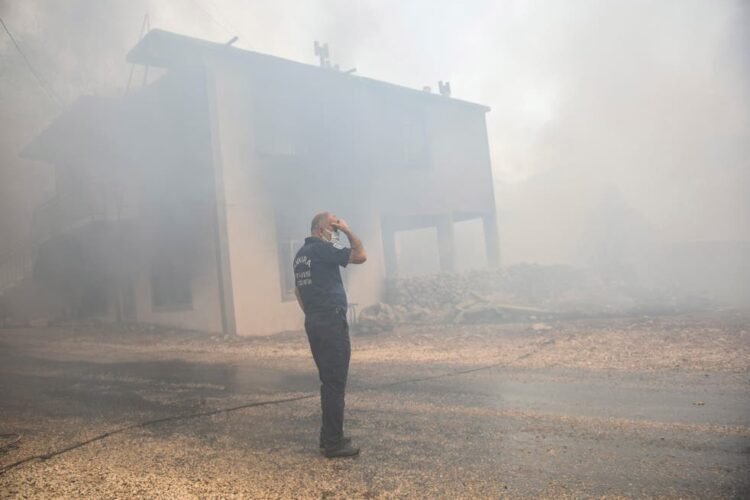A warmth wave preparing southeast Europe has filled dangerous out of control fires in Turkey and compromised the public force lattice in Greece as governments mixed Monday to get the assets expected to adapt to the crisis.
Temperatures arrived at 45 C (113 F) in inland spaces of Greece and close by nations and are relied upon to stay high for the vast majority of the week.
Engaging destructive fierce blazes along its coastline for a 6th day, Turkey expanded an interest for worldwide help and was guaranteed water-dropping planes from the European Union. The flames have been faulted for the passings of eight individuals lately.
The assistance for occupants in Turkey’s fire-assaulted regions couldn’t come soon enough. At the waterfront town of Bozalan, occupant Esra Sanli investigated at the burst.
“It’s consuming. It’s clearly consuming. There’s no plane, there’s no helicopter, there are no (frontage) roads,” she said, crying. “How could this be going to be stifled? How?”
In Greece, a crisis was announced in fire-hit regions on the island of Rhodes, which is close to the Turkish coast. Laborers with ailments were permitted to go on vacation work, while Greek coal-terminated force stations scheduled for retirement were brought once more into administration to support the public matrix, under tension because of the far and wide utilization of cooling.
Pregnant and other weak specialists in North Macedonia were advised to remain at home.
Dann Mitchell, an educator of environment science at the University of Bristol, said the warmth wave in southeast Europe “isn’t at all surprising, and likely improved because of human-instigated environmental change.”
“The quantity of outrageous warmth occasions all throughout the planet is expanding year on year, with the main 10 most sizzling a long time on record all happening since 2005,” Mitchell disclosed.
“This year, we have seen various critical occasions, including an especially emotional warmth wave in western Canada and the U.S., that was outrageous in any event, for current degrees of environmental change,” Mitchell said. “These dark swan occasions have consistently occurred, however presently they sit on the foundation of a more sweltering environment, so are much more dangerous.”
As sweltering climate edged toward the south, Italy and Croatia were encountering storms just as out of control fires. A little cyclone in Istria, on Croatia’s northern Adriatic coast, brought down trees that obliterated a few vehicles, hours before an enormous out of control fire ejected outside the close by resort of Trogir, undermining homes and the nearby force supply.
Approximately 30 individuals were treated for light smoke inward breath in Italy’s beach front city of Pescara after blazes tore through a close by pine woodland. Sea shore attendees close by must be saved via ocean Sunday from that rapidly spreading fire.
“That zone of pine woods is a nature hold, and it’s totally obliterated. It carries tears to see it. The ecological harm is inestimable. This is the core of the city, its green lung and today it is obliterated,” Pescara Mayor Carlo Masci said.
Cyprus, recuperating from a significant rapidly spreading fire last month, kept water-dropping planes on the lookout to react to flames as they broke out.
“In the event that you don’t respond immediately with an enormous reaction to any episode, things can turn troublesome rapidly,” ranger service administration boss Charalambos Alexandrou told state-run media. “The conditions are war-like.”
On a visit to the force lattice administrator Monday, Greek Prime Minister Kyriakos Mitsotakis encouraged individuals from general society to keep away from daytime utilization of stoves, clothes washers and other energy-requesting machines to lessen the danger of power outages. He portrayed the climate conditions in Greece as the most extreme since a dangerous warmth wave in 1987.
It was the year that Ioanna Vergou, appointee civic chairman of the northern Greek town of Skydra, was conceived. The town of 5,500 momentarily positioned among the most sizzling in the country. She said metropolitan laborers had been given before shifts and those requiring public administrations were given water and shipped off a cooled holding up region.
“Many individuals here have contrasted the warmth wave with what occurred in 1987,” she said. “In any case, ideally it will be simpler this time round. We are altogether hanging tight for it to pass.”
Disclaimer: The views, suggestions, and opinions expressed here are the sole responsibility of the experts. No Unique Analyst journalist was involved in the writing and production of this article.

